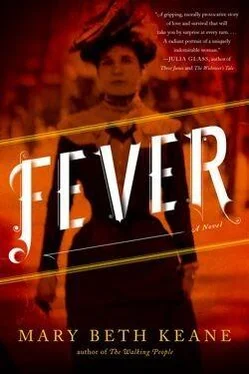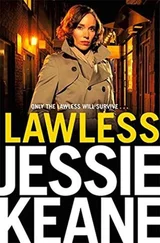“No,” Mary said. “Have you? Joan said he does odd jobs for Driscoll.”
“I haven’t seen him either. Sometimes he’s here a lot in a given week, and then not for a few weeks. And I think he tries his best to avoid me and Joan.”
Though Mary had instructed herself not to care, to try to forget about him, it was Alfred she had in her mind whenever she pushed out the building’s front door and remembered her posture, when she put a protective hand to her hair. She braced herself to see him and then when a few days went by and she didn’t see him, she realized she was disappointed.
“So tell me everything,” Fran said. “Start from the beginning.” As their coffee went cold, Mary described Dr. Soper, what he said about her, the day they captured her, the Willard Parker Hospital, North Brother, John Cane, the nurses and their collection canisters, Mr. O’Neill, the disappointment of the hearing and then finding out about Liza Meaney, the boy, how disorienting it was to be back in New York City without being a cook, how she feared she’d never get used to it. When she finally stopped talking, Fran was quiet for a minute and then announced that she’d like to punch that Dr. Soper in the face, and Mary laughed. Never before had she thought about Soper and laughed, and it felt, for the first time, like that terrible part of her life was truly behind her. The two women talked until the clock struck midnight and when she left, Mary knew they’d be fine.
Living with Liza seemed perfect, at first. It had been years since Alfred felt what it was like to be sober and sound on his own two feet, his lungs full of air, his spine straight, his body strong. When he came home, Liza didn’t seem the least bit surprised that he’d worked all day. She didn’t make a fuss over it, like Mary used to, and with Liza he could sense no panic that he would change his mind, that the next day would see him having slipped down to the place of a man who didn’t work. He was healthy and capable and Liza didn’t watch him like Mary did. She didn’t narrow her eyes and know things the way Mary knew them, sometimes before he knew himself. When he brought her his wages, she looked at him like he’d handed her a block of solid gold, and she needed those dollars and cents. The boy ate as much as Alfred and Liza combined, and he was smart. He needed books, scratch pads, decent clothing, shoes.
But after almost ten months of the arrangement, Alfred faced what he knew all along, that Liza Meaney was not Mary Mallon, and never would be. When they made love she was dutiful and kind. She never made up an excuse, or pretended to be asleep, or told him to go fly a kite, and she looked politely away when he removed the night cap from its tin. If she’d ever seen one before she didn’t mention it, nor could he tell if she liked or disliked what they were doing. One time, to test her, he stopped abruptly, pulled away, tugged on his trousers, and told her they could do it later since she wasn’t feeling up to it, and she said that was fine, as if he’d suggested they walk north along Broadway instead of south. “Oh, well, you don’t seem fine. You seem distracted,” he said, and she didn’t argue. She just pulled her dress back over her shoulders and went about fastening the row of buttons. Another time he kept pushing, and nuzzling, and reaching under her clothes to see when she would stop him but she never stopped him, even though he knew she was tired and wanted nothing more than to sleep. He kept testing and testing and next thing he knew he was inside her with Samuel doing his homework in the next room, and only once, one single instant, when the bed creaked, did she push him away and look to the door in case Samuel might have heard.
This is how most women are, he told himself. This is how women should be, only he’d never known what a woman should be like because he’d mostly ever been with Mary, who was not a normal woman. Even the newspapers noticed it. Back when she was first captured most of the newsmen commented that she had the bearing of an Irish person, but one reporter observed that she in fact had the bearing of a man. Irish or not, he didn’t specify. It was true sometimes she stood with her legs planted wide, especially when she felt herself backed into a corner, but nothing about Mary was manly to the eye and so it must have been something else that this man had seen, a way of conducting herself, a way of glancing around a room. Fran Mosely, who saved the papers for him back then, had said she didn’t understand that one at all because who in their right mind seeing Mary’s thick mane of strawberry blond hair and slim waist would see anything other than a woman. Alfred had said, “I know what he means, I think,” and Fran had looked at him like he was the bastard she’d always suspected him to be.
Mary didn’t need the money he brought in because she had her own money, more money than he earned. He knew exactly how she felt about everything, because she told him, usually very loudly, often while banging pots and pans for emphasis. When she didn’t want him to touch her she told him to get lost, but when she did, she didn’t mind reaching for him first, coming around to his side, kissing the back of his neck and asking if he was too tired. Liza Meaney would never do that. Not in a thousand years. At first, he thought how wonderful that was. How ladylike. Liza was like a delicate bird and how much more interesting that made everything when she let him unbutton her, and how fiercely she blushed when he lifted her to sit on top of him, or whispered to her to turn around. She looked disoriented and terrified whenever he moved her to a different position, and after just a few seconds she always dove back down to the covers and to her back where she felt comfortable and safe, and he’d laugh. “Okay, okay,” he’d say, and he could see how much he’d have to show her, if she was willing to be shown, but after ten months he could see she didn’t want that. Sex for Liza Meaney would always be part of the transaction they’d agreed upon, and although she liked him, and was attracted to him — Alfred felt sure he’d be able to tell if she wasn’t — she saw sex with him the same way she saw making his breakfast, washing his clothes, having supper on the table when he got home.
They’d been engaged for six months but still weren’t married. She showed her ring to all their neighbors — a simple silver band — and maybe that’s all she’d wanted, for the world to know that she was not the kind of woman who lived with a man without a promise. At first, she said she wanted to figure a way to bring her mother from England for the ceremony, and sometimes she said she wanted to wait until the school year was over, so Samuel wouldn’t be distracted. Distracted? Alfred wanted to ask. What would be so distracting? Or for that matter, what was there to cross an ocean for? Alfred had imagined himself and Liza walking to City Hall, signing a few papers, and then going to a restaurant for supper. But he didn’t say anything, and when the weeks wore on without any letters arriving from England, without any discussion of whether they’d have a small party, he stopped worrying about it. Maybe accepting the engagement without pushing actual marriage was the small way she was asserting herself, that and making him continue with the cure, even though he felt he didn’t need it anymore.
The medicine they gave in the beginning made him sick, and he assumed that was part of it: making the patient so sick that he wouldn’t be able to hold alcohol or anything else. He was weak for two weeks, curled up in bed and vomiting into the bowl Liza gave him, and still, she came in every four hours with another dose she’d measured out into a teacup, just as the doctor had instructed. “It’s for people far worse than I am,” he’d told her when he first came back from Bellevue, where he’d gone to see what it was all about. Ads for the cure were posted all around the neighborhood, and published in big block letters in the newspapers. “I saw them. Jesus, I saw them. I’m not like that. My God, one man, he wasn’t much more than a boy, he was sweating a puddle on the floor but kept complaining of cold. I just like to have a nip now and again and if you go out and find a man who never has a nip now and then I’ll saw off my right arm.”
Читать дальше












